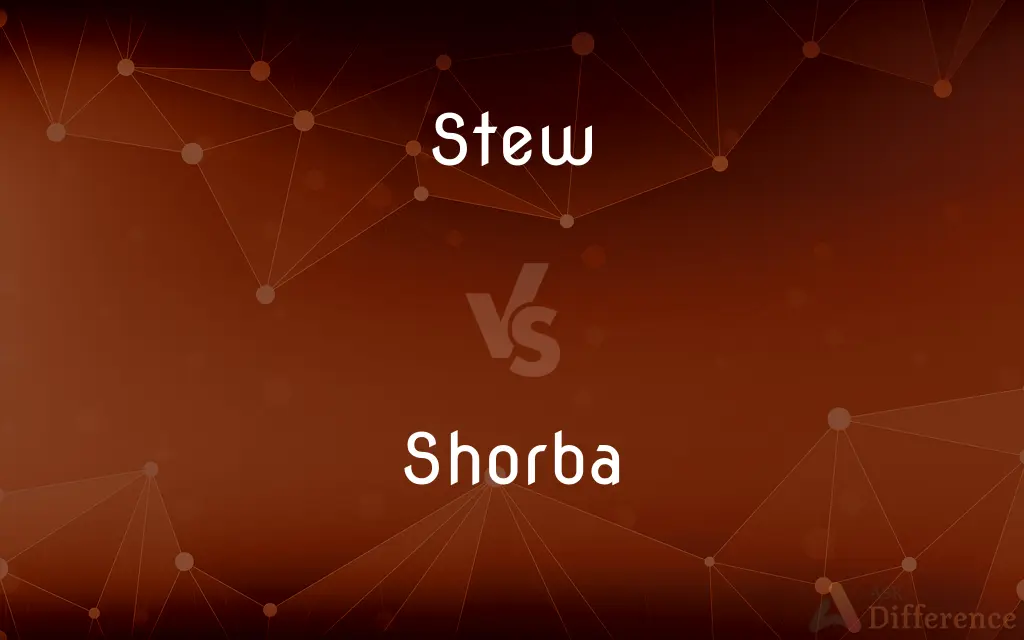Stew vs. Shorba — What's the Difference?
By Tayyaba Rehman & Urooj Arif — Published on February 8, 2024
Stew is a thick, slow-cooked dish with solid ingredients in a liquid, while Shorba is a spiced, often thinner soup traditionally from Middle Eastern and South Asian cuisines.

Difference Between Stew and Shorba
Table of Contents
ADVERTISEMENT
Key Differences
Stew and Shorba are both hearty dishes, but they differ in consistency and origin. Stew, common worldwide, is a thick dish made by slow-cooking meat and vegetables in a liquid. Shorba, originating from Middle Eastern and South Asian cuisines, is typically a thinner, spiced soup.
The cooking method for stew involves simmering ingredients over a low heat for a long time, allowing flavors to meld and the liquid to thicken. Shorba is often prepared by boiling meat and spices, resulting in a flavorful broth that is lighter than stew.
Stew is known for its hearty and robust texture, often served as a main course. Shorba, on the other hand, can be either a light meal or a starter, known for its aromatic and spiced flavor profile.
Ingredients in a stew typically include larger chunks of meat and vegetables, making it a filling meal. Shorba generally contains finely chopped or shredded ingredients and is more focused on the broth.
Cultural significance differs as well; stew is a versatile dish with variations across different cultures, while Shorba holds a special place in Middle Eastern and South Asian culinary traditions, often served during special occasions and in Ramadan.
ADVERTISEMENT
Comparison Chart
Origin
Global, with regional variations
Middle Eastern and South Asian
Consistency
Thick and hearty
Typically thinner and broth-based
Primary Ingredients
Large chunks of meat and vegetables
Finely chopped or shredded ingredients
Cooking Method
Slow-cooked, ingredients simmered together
Boiled meat and spices, focusing on the broth
Cultural Significance
Common in many cultures, versatile dish
Special significance in Ramadan and festive meals
Compare with Definitions
Stew
A thick, slow-cooked dish with meat and vegetables.
She simmered the beef stew for hours until tender.
Shorba
Often thinner and broth-based, with aromatic spices.
The chicken shorba was delicately flavored with cumin and coriander.
Stew
A dish where ingredients are cooked together in one pot.
He made a vegetable stew using fresh garden produce.
Shorba
Typically contains finely chopped or shredded ingredients.
She enjoyed the vegetable shorba with finely diced carrots and peas.
Stew
A hearty meal often containing a rich, flavorful liquid.
The winter stew was warming and filling.
Shorba
A spiced soup from Middle Eastern and South Asian cuisines.
The restaurant served a fragrant lentil shorba.
Stew
To cook (food) by simmering or boiling slowly.
Shorba
Holds a special place in festive and religious meals.
During Ramadan, shorba is a traditional dish to have at iftar.
Stew
To undergo cooking by boiling slowly or simmering.
Shorba
Served as a light meal or a starter.
For breaking the fast, they began with a bowl of shorba.
Stew
(Informal) To suffer with oppressive heat or stuffy confinement; swelter.
Stew
(Informal) To be in a state of anxiety or agitation.
Stew
(obsolete) A cooking-dish used for boiling; a cauldron.
Stew
A heated bath-room or steam-room; also, a hot bath.
Stew
(archaic) A brothel.
Stew
(obsolete) A prostitute.
Stew
A dish cooked by stewing.
Stew
(Sussex) A pool in which fish are kept in preparation for eating.
Stew
An artificial bed of oysters.
Stew
(slang) A state of agitated excitement, worry, and/or confusion.
To be in a stew
Stew
(informal) A steward or stewardess on an airplane or boat.
Stew
To cook (food) by slowly boiling or simmering.
I'm going to stew some meat for the casserole.
The meat is stewing nicely.
Stew
(transitive) To brew (tea) for too long, so that the flavour becomes too strong.
Stew
To suffer under uncomfortably hot conditions.
Stew
To be in a state of elevated anxiety or anger.
Stew
A small pond or pool where fish are kept for the table; a vivarium.
Stew
An artificial bed of oysters.
Stew
A place of stewing or seething; a place where hot bathes are furnished; a hothouse.
As burning Ætna from his boiling stewDoth belch out flames.
The Lydians were inhibited by Cyrus to use any armor, and give themselves to baths and stews.
Stew
A brothel; - usually in the plural.
There be that hate harlots, and never were at the stews.
Stew
A prostitute.
Stew
A dish prepared by stewing; as, a stewof pigeons.
Stew
A state of agitating excitement; a state of worry; confusion; as, to be in a stew.
Stew
To boil slowly, or with the simmering or moderate heat; to seethe; to cook in a little liquid, over a gentle fire, without boiling; as, to stew meat; to stew oysters; to stew apples.
Stew
To be seethed or cooked in a slow, gentle manner, or in heat and moisture.
Stew
Agitation resulting from active worry;
Don't get in a stew
He's in a sweat about exams
Stew
Food prepared by stewing especially meat or fish with vegetables
Stew
Be in a huff; be silent or sullen
Stew
Bear a grudge; harbor ill feelings
Stew
Cook slowly and for a long time in liquid;
Stew the vegetables in wine
Stew
Can be adapted with various ingredients and seasonings.
They experimented with a spicy stew recipe.
Stew
Often served as a substantial main course.
The stew was the centerpiece of their dinner menu.
Common Curiosities
What makes a stew thick?
Stew is thickened by the slow cooking of its ingredients, which allows the release of natural starches.
Is stew a winter-only dish?
While often associated with winter, stew can be enjoyed any time of the year.
What is the typical base for shorba?
The base for shorba is usually a broth made from meat or vegetables, infused with spices.
Can stew be made vegetarian?
Yes, stew can be made vegetarian by using vegetables and legumes instead of meat.
Can stew be frozen for later use?
Yes, stew generally freezes well and can be stored for future meals.
Is shorba always spicy?
Shorba is often spiced but not necessarily spicy; it can range from mild to hot.
What kinds of meat can be used in stew?
Stew can be made with various meats, including beef, lamb, chicken, and pork.
Is shorba a main dish?
Shorba can be a light main dish or a starter, depending on its ingredients and serving size.
What are common spices in shorba?
Common spices in shorba include cumin, coriander, turmeric, and cinnamon.
Can shorba be served cold?
Shorba is traditionally served hot, but some variations can be served cold.
How long does it take to cook a stew?
Cooking time for stew varies but typically ranges from one to several hours.
Can shorba be made quickly?
While some versions of shorba can be made quickly, others require longer cooking times for flavor development.
What vegetables are commonly used in stew?
Common vegetables in stew include potatoes, carrots, onions, and celery.
Are there vegetarian versions of shorba?
Yes, vegetarian shorba can be made using vegetables and vegetable broth.
Is bread served with stew?
Stew is often served with bread, which complements its thick consistency.
Share Your Discovery

Previous Comparison
Endpoint vs. Equivalence Point
Next Comparison
Satin Nickel vs. Brushed NickelAuthor Spotlight
Written by
Tayyaba RehmanTayyaba Rehman is a distinguished writer, currently serving as a primary contributor to askdifference.com. As a researcher in semantics and etymology, Tayyaba's passion for the complexity of languages and their distinctions has found a perfect home on the platform. Tayyaba delves into the intricacies of language, distinguishing between commonly confused words and phrases, thereby providing clarity for readers worldwide.
Co-written by
Urooj ArifUrooj is a skilled content writer at Ask Difference, known for her exceptional ability to simplify complex topics into engaging and informative content. With a passion for research and a flair for clear, concise writing, she consistently delivers articles that resonate with our diverse audience.
















































